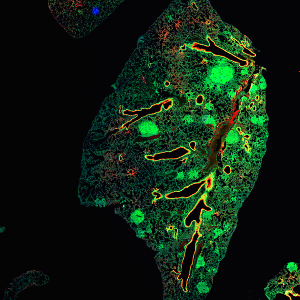
Lung tissue affected by tumors (large lesions)
Deubiquitylating enzymes (green) are overrepresented in tumors and prevent the degradation of oncoproteins. | © Diefenbacher Lab: Nikolett Pahor & Oliver Hartmann
An international research project on the subject of “Understanding and targeting degradation-resistant tumors” has been granted funding of 1.655 million euros through the German-Israeli Project Cooperation (DIP) program. The project includes scientists from LMU, the Technion – Israel Institute of Technology in Haifa, Goethe University Frankfurt, and Helmholtz Munich. The DIP program was established in 1997 by the German Federal Ministry of Education and Research (BMBF) to strengthen excellence in German-Israel research cooperation.
The project will investigate to what extent short-lived, degradable oncoproteins are subject to enhanced stabilization, which is a typical characteristic of many aggressive and therapy-resistant cancer types. “The decoding of the molecular and cellular foundations of the oncoprotein stabilization pathways and the development of therapeutics that target these cancer types are urgently required and would cover an unmet clinical need,” says LMU professor and group leader at Helmholtz Munich Markus Diefenbacher. The project partners from Germany and Israel want to combine their expertise to research fundamental mechanisms that promote tumor formation. To this end, they are using highly advanced chemical and biochemical methods from the field of targeted protein degradation in combination with fly and mouse genetics as well as clinical studies and data. “With our pooled expertise, we will investigate new levels of protein regulation, including enzymes and mechanisms that are fundamental for the formation of degradation-resistant tumors,” explains Diefenbacher.









